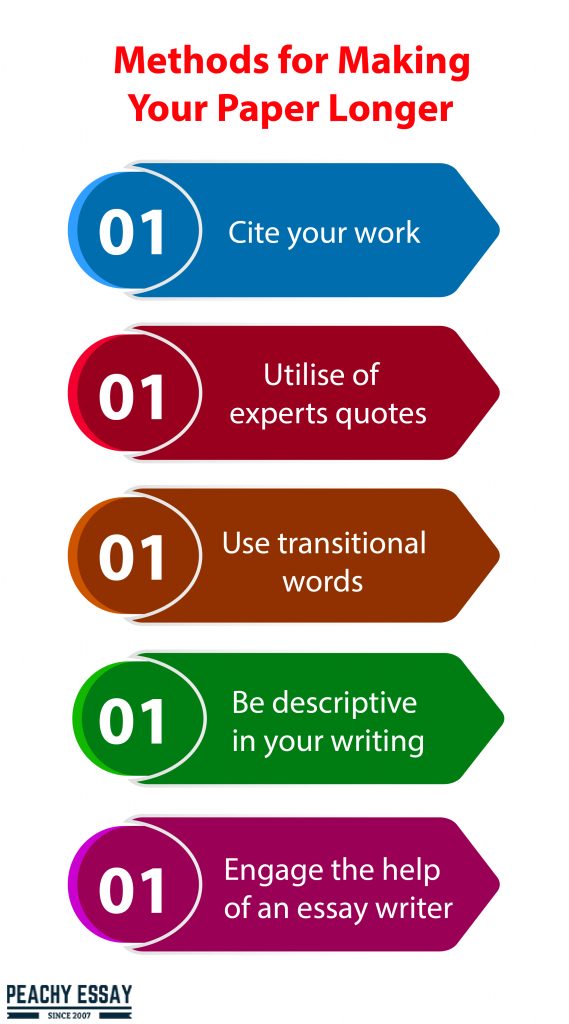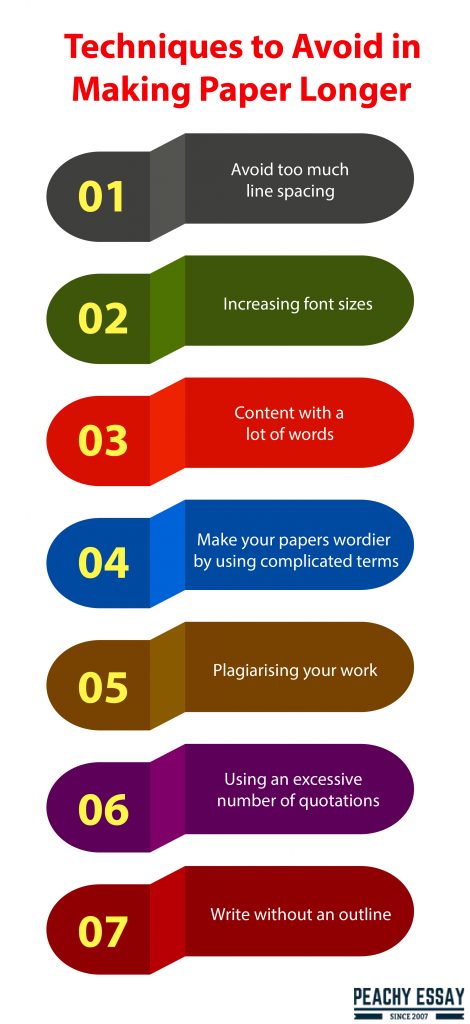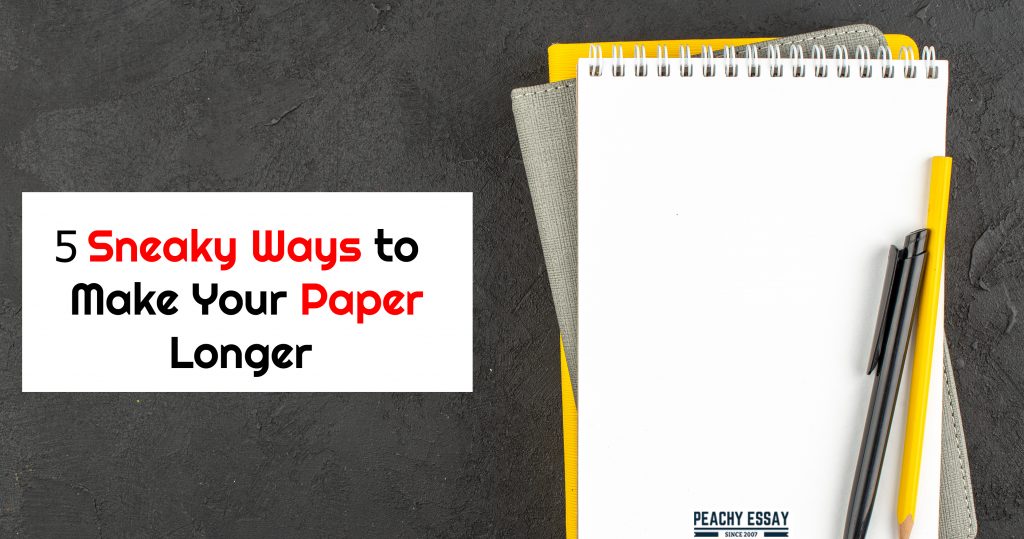You’re working on a paper, and the deadline is near, but you’re still far short of the page restriction. This is a situation that many students find themselves in. Fortunately, there are a few techniques you may use to extend your paper. Increasing the font size, including an extended header, and adjusting the space between lines are just a few ways to make your essay seem longer. However, keep in mind that disobeying your teacher’s rules may result in a worse grade.
Someone with my background, on the other hand, can identify those tricks with little or no effort.
Here are a few strategies for making your college paper lengthier. You may use a single one or a combination of many.
How can I lengthen my essay?
You may lengthen your essay by include citations, utilising appropriate quotes with transitional phrases, being more descriptive, or paying a professional to do so for you.
These methods for making your paper longer will work, and your professor will never know you employed any tricks to lengthen your essay.

Cite your work
By using citations in your work, you may extend its length. Make careful to include quotes to boost the word count.
Remember that for citations to be adequate; they must be formatted correctly and based on reliable sources.
Utilise of experts quotes
Make appropriate use of quotes if you’re searching for terms to lengthen your work.
This is a legitimate method to increase your word count without creating the impression that you aren’t trying to lengthen your research paper. Remember not to include too many quotes in your paper.
To ensure that the paper flows and merges smoothly with the quotes, including your own words. Also, double-check your formatting and citations.
Use transitional words
Transitional words may extend the length of your college paper. A document with too many transitional words, on the other hand, may seem to be too wordy.
So it’s up to you to be clever about it and proofread your work well before submitting it. Transitional words, when appropriately utilised, may enhance the readability of your writing.
Because of this, call your attention to it and others are some of the transitional words you should consider employing in your work.
Be descriptive in your writing
You may lengthen your paper by going into great depth on a single concept.
For example, if you want to clean your home, be specific about the places you should concentrate on, as well as the detergents you should use.
However, keep in mind that if you concentrate too much on a single topic, your work may seem to be too wordy.
Engage the help of an essay writer
Asking a professional to write my essay for me cheap is one of the finest and most neglected methods to make your work seem lengthier. An essay writer concentrates on providing high-quality work to their customers.
As a result, they will take their time to produce a well-researched paper that reaches its word limit without difficulty.
Students struggle to meet their word limit for two reasons: they begin writing on a paper when it is nearly due or unfamiliar with the subject.
Students that attempt to lengthen their papers do so at the expense of their substance. Even though some of their tactics seem perfect, teachers may quickly spot them while reading the paper.
This isn’t to say that there aren’t legitimate methods to increase word count. The methods listed above will teach you which tactics to employ and which to avoid when writing your paper.
Simple methods such as raising your text size and plagiarising are no longer effective.
Ideas for Lengthening Your Paper
Make use of examples
When you’re trying to figure out how to make an essay longer, start with the assertions you’ve made. Go back and look for the concepts you presented. Did you provide any instances to back up your claims? If you didn’t, consider including some research that backs up your argument. This will not only enhance your points, but it will also make your paper longer.
If you argued that UFOs were genuine, you might provide an example of a sighting from a witness or cite a documentary. You should use many examples for each concept! Because your arguments are substantiated, your professor will be pleased, and your writing will be lengthier as a consequence.
Use phrases to transition ideas
Including transitional words is a more natural approach to extend the length of your text. It enables you to move from one concept to the next while gently guiding your readers along. They will also extend the length of your text! It’s a win-win scenario for both parties. In your article, try using some of the following phrases:
Try outlining in the other direction
It’s exactly what it sounds like: reverse outlining. After you’ve finished writing your paper, go through it again and make an outline based on what you’ve previously written. This may help you rearrange pages so that they make better sense to others who are reading your work and identify places where you need to improve.
Take advantage of the chance to lengthen your work if you notice a point you made that might be clarified more.
If you find long paragraphs introducing several concepts, split them into smaller paragraphs and explain each point more fully.
Review the prompt again
You’ve probably read your prompt a million times by now, but revisit it if you’re having trouble generating a very lengthy text. Consider if you’ve addressed all of your professor’s queries. Did you use persuasive language to back them up? Take the time to double-check that you’ve met all of the criteria. If you haven’t already, you should add additional information to your paper.
Try to format your paragraphs
Make sure that each paragraph has the proper formatting. A subject sentence, supporting evidence and argument, and a conclusion or transition should be included in each paragraph of the essay format. If portions of this formatting are missing from some of your paragraphs, write phrases to fill in the gaps.
Increase the number of words you use
It’s akin to the ridiculous advice to “simply use more phrases or words!” But pay attention to what we’re saying and take a look at your work. There are a few clever methods to utilise multiples instead of one…
Verbs that begin with “to be” should be included. Sayings like “I eat fast” should be avoided. Try writing something like, “I am a fast eater.”
Be more detailed in your writing. “We had a good time at the fair,” don’t mention. “This weekend, my buddy and I went to the fair,” you might say. “Riding the Ferris wheel and eating funnel cakes was a blast.”
Convert verbs to nouns. “I came to the conclusion that…” is lengthier than “I came to the conclusion that…”
See if you can disprove your own assertions
Consider the counter-arguments to your thesis and make sure you’ve answered them. Sure, you could make a compelling case for your viewpoint. What, on the other hand, would someone in the other camp say? And, in answer, what would you say? Making sure their answers are already in your paper is a fantastic way to make sure you’ve covered all the bases… and a great way to add some length if your paper is a bit short.
Ensure that your paper’s structure is sound
Confirm that your introduction, thesis statement, and conclusion are all strong. Although you may be concentrating on the body of your paper and the data that supports your viewpoint, a good introduction, thesis, and conclusion are essential. Making sure your paper begins off strong (strong intro), has a solid foundation to build on (strong thesis), and leaves the reader satisfied (excellent conclusion) is a fantastic approach to make it better—and longer!
Tricks That No Longer Work in Making Your Paper Longer
However, this does not rule out the possibility of lengthening your paper legitimately. But, to be safe, here are some techniques that you may believe are working but that you should avoid.

Avoid too much line spacing
Don’t use line spacing to make your college paper longer. The majority of students believe that college instructors are incapable of distinguishing between line spacing.
Increasing font sizes
We can identify the difference in font sizes in your works just as we can detect the difference in line spacing. Typeface 12 Times New Roman is the standard font for most college papers.
On the other hand, students will attempt to alter typefaces by raising them to 12.5 or 13. This may seem to be an intelligent approach, but we can tell the difference.
Professors may or may not indicate the kind of typeface to be used. Students, in this instance, attempt to influence them by choosing larger fonts such as Ariel Black and assuming that we would accept it. We can speak the truth, however.
Content with a lot of words
You’ve undoubtedly encountered someone who rambles on and on about something, causing you to lose track of the plot. A good tale will lose its significance if it has too many words.
I’ve seen pupils believe that by adding words to their work, the word count would rise. Technically, yes, but a long-phrase or paragraph is boring, and your thoughts may get lost in the shuffle.
I’ve read papers that had a fantastic beginning but were tedious to read the rest of the way. As a result, the enthusiasm fades and the desire to complete the piece wanes.
Students may also make their papers wordier by using complicated terms
I get that you want to seem astute, but employing complicated phrases is not the best way to do it. Simple words are considerably easier to understand and absorb.
It’s the same as cooking. Using too many spices and herbs can alter the flavour of the meal.
Plagiarising your work
Some students continue to copy work from the internet, paste it into word documents, and then submit it as their own.
Plagiarism may help you get more words, but it’s not the best method. Copying and pasting is not only a time-consuming method of completing tasks, but it also demonstrates academic dishonesty.
Some students believe that submitting material previously authored is not plagiarism since it is their work.
This is self-plagiarism, and if your professor chooses to report you, you will face severe consequences. If you submit plagiarised work, you risk being expelled.
Using an excessive number of quotations
Quotations aren’t terrible; in fact, they help you get more words on the page. They may make your paper seem as though you spent time researching it.
However, most students make the mistake of utilising too many quotes.
If you include too many quotes in your paper, it will seem less personal.
You will lose the opportunity to emphasise your points of view, which is irrelevant to the paper’s purpose.
The usual guideline for quoting in a research paper is that it should not exceed 20%.
Write without an outline
Although an outline is an essential component of your paper, most students neglect to make one before working on their projects. An overview is nothing more than a road map to assist you in writing your paper. It includes elements that will assist you in determining what subjects and subtopics to write about.
I can detect the difference between a paper prepared with and without an outline. You will make the error of repeating points if you compose a paper without a plan. You may also overlook some of the areas on which you should have concentrated, resulting in a lack of flow in your writing.


